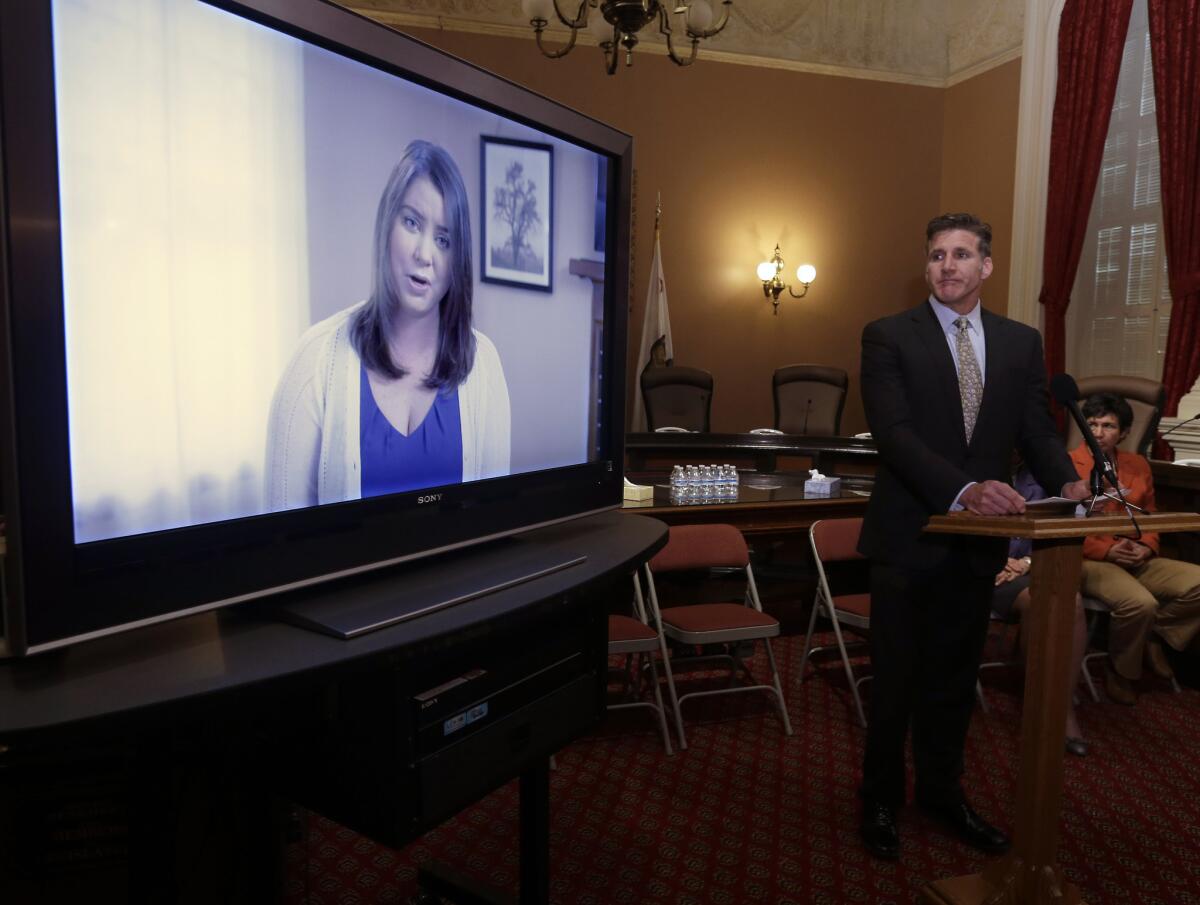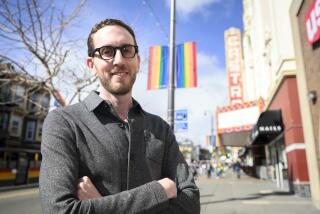California lawmakers revive measures on assisted suicide, smoking age

During a March 25 appearance at the California Capitol, Dan Diaz, the husband of Brittany Maynard, watches a video of his wife recorded 19 days before her assisted-suicide death. Diaz was at the Capitol again on Aug. 18, urging support for an aid-in-dying bill.
Gov. Jerry Brown was specific about his goals when he called two special legislative sessions.
Lawmakers, he said, should bring him new plans for financing public healthcare and road repairs, problems that have festered for years.
But he could get much more than he bargained for as lawmakers from both parties seize an opportunity to push a raft of tangential and even unrelated measures. Some would not provide a single dollar toward the governor’s objectives of filling potholes and boosting money for healthcare programs.
On Tuesday, backers reintroduced a stalled proposal to let doctors help terminally ill patients end their own lives by prescribing lethal doses of drugs. Other lawmakers are trying to raise the smoking age from 18 to 21 and rein in the use of electronic cigarettes — measures that did not fly in the regular legislative session.
Some want to squeeze in an expansion of mass transit, funded with a higher tax on diesel fuel. One legislator introduced a bill intended to open a specific lane on a bridge in his district. Another tapped a controversy involving Planned Parenthood to propose a ban on the sale of fetal tissue for research purposes.
Special sessions are a tool for governors to focus lawmakers’ attention on specific issues. But they can also offer a way to bypass committees that have blocked proposals, or threatened to do so.
The governor’s office criticized the reintroduction of the aid-in-dying bill, saying that the issue merits careful consideration but should not be part of the special session.
The proposal met with resistance in the Assembly health committee earlier this year. But the committee for the special session doesn’t include 10 members of the regular panel, and among the absent are three who opposed the measure.
Assemblywoman Susan Eggman (D-Stockton), the bill’s primary author, defended the decision to bring the issue into the special session on healthcare financing.
“It’s about making healthcare work better,” she said. “Healthcare is about providing care, but it’s also about providing relief at the end of life.”
A spokesman for Eggman said she would push ahead with the bill despite the governor’s concerns.
Opponents of the emotionally laden bill decried the move as a heavy-handed attempt to force through a measure that couldn’t succeed through regular channels.
“It is particularly troubling that ... proponents are linking this bill with healthcare financing,” said a statement from Californians Against Assisted Suicide.
“That should be truly frightening to those on Medi-Cal and subsidized healthcare, who quite logically fear a system where prescribing suicide pills could be elevated to a treatment option,” the statement said.
The assisted suicide bill isn’t the only one making a comeback. So are proposals to tighten restrictions on tobacco and ban e-cigarettes in places where smoking is prohibited.
Unlike a bill that would increase the tax on a pack of cigarettes by $2, those measures would not produce new money for public healthcare programs. But supporters said they are appropriate in the special session because limits on smoking would reduce healthcare costs.
“The package of tobacco-control measures we have introduced will reduce smoking and that will have a very large and rapid impact on health care costs,” said Sen. Ed Hernandez (D-West Covina), author of the measure to raise the smoking age to 21.
When it comes to transportation, Brown wants a plan for fixing up dilapidated highways, roads and bridges. The state faces $59 billion in maintenance needs and local governments say they need an additional $78 billion.
But some lawmakers want to use the opportunity to find more revenue for mass transit. Their measure would triple the sales tax on diesel fuel, producing an estimated $300 million.
Sen. Benjamin Allen (D-Santa Monica) said getting more Californians into buses and trains could help reduce road wear and tear.
“To talk about transportation infrastructure without talking about transit would be a mistake,” he said.
Assemblyman Marc Levine (D-San Rafael) has a much more specific proposal — one that would require state officials to open a third lane on a Bay Area bridge. The lane is currently reserved for emergency responders or drivers who break down while crossing from San Rafael to Richmond, and Levine said that causes traffic backups in Marin County.
Bob Haus, a spokesman for Caltrans, said it’s not so simple. A road connecting to the bridge would also have to be widened and a detailed environmental review would be required because the project is adjacent to San Francisco Bay.
Asked why his bill should be included in the special session, Levine cited language in the governor’s order calling for legislation that could “expedite project delivery.”
“When they are talking about billions of dollars for infrastructure, I’d like them to say publicly why they can’t get this open in a more timely manner,” he said.
chris.megerian@latimes.com
Twitter: @chrismegerian
patrick.mcgreevy@latimes.com
Twitter: @mcgreevy99
ALSO:
California physicians end opposition to aid-in-dying bill
Maynard lobbied Gov. Brown on aid-in-dying bill just before her death
Column: Aid-in-dying bill will be revived
More to Read
Start your day right
Sign up for Essential California for news, features and recommendations from the L.A. Times and beyond in your inbox six days a week.
You may occasionally receive promotional content from the Los Angeles Times.







